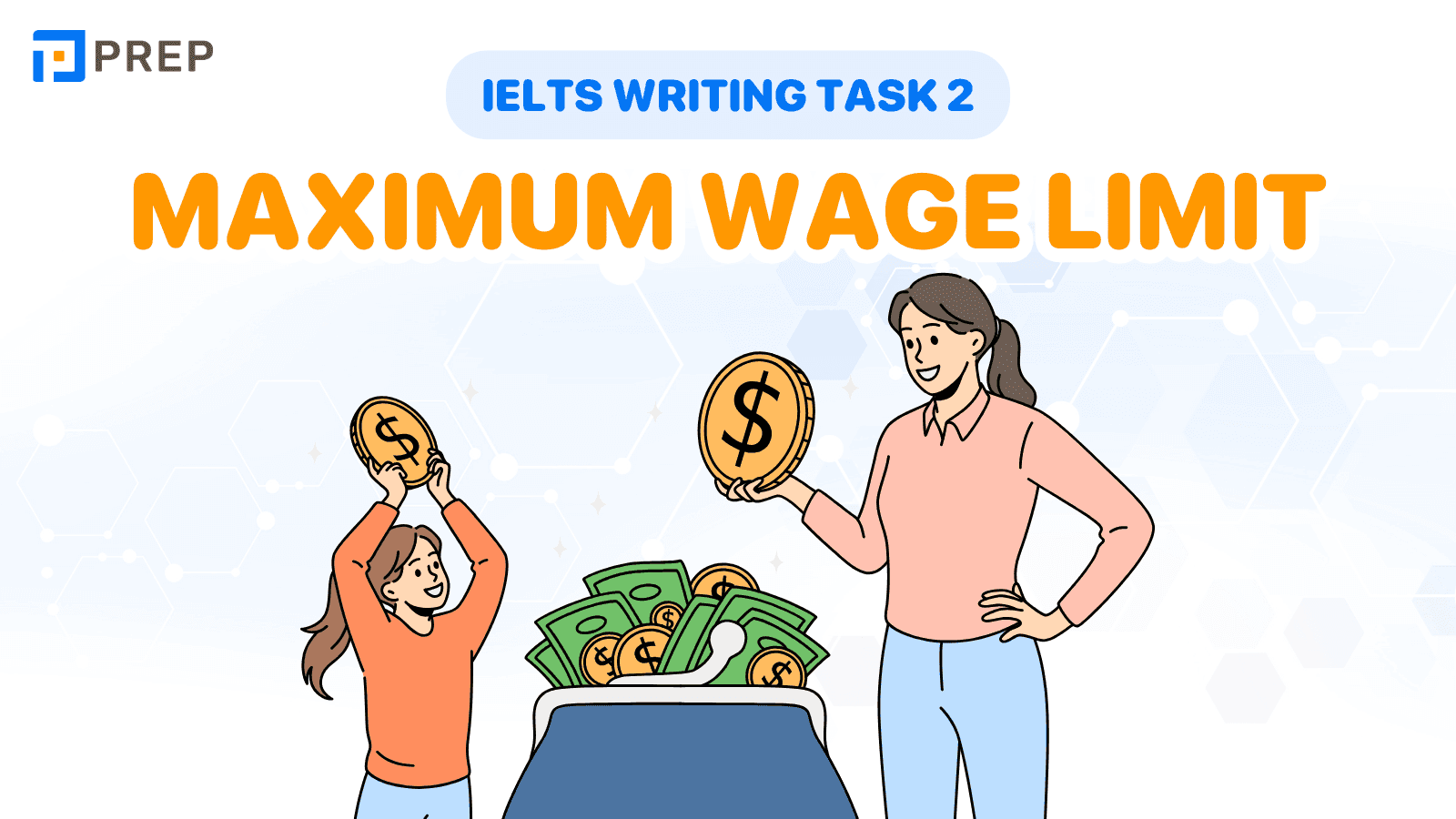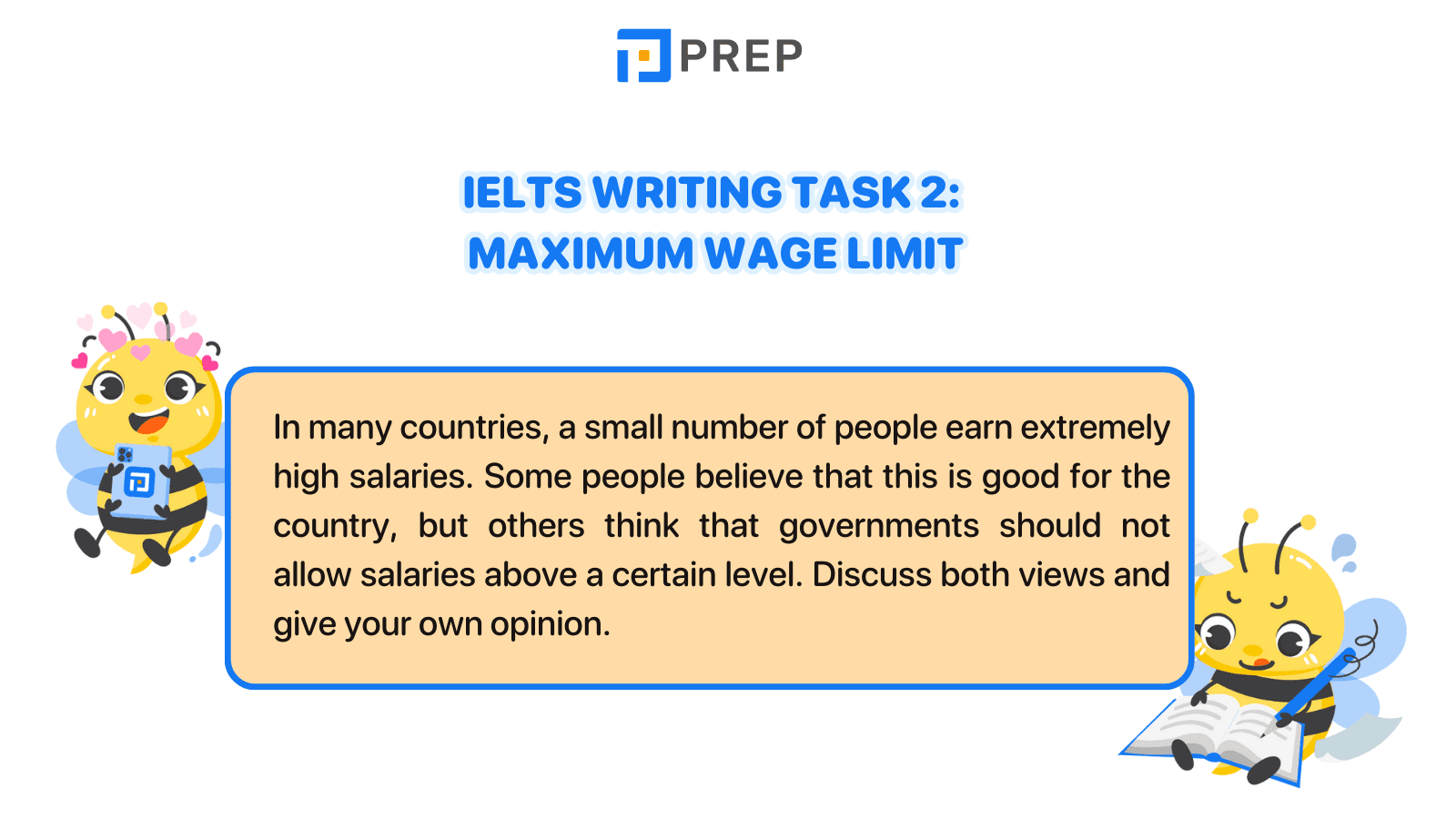Sample IELTS Writing Task 2: Maximum wage limit
"In many countries, a small minority of people have extremely high salaries. Some believe this is good for the country, but others argue the government should not allow salaries above a certain maximum limit." What is your view on this opinion? Please present your response in the IELTS Writing Task 2: Maximum wage limit. Additionally, refer to the outline, sample, and vocabulary compiled by top-tier teachers at PREP below!

I. IELTS Writing Task 2 Maximum wage limit
The task: IELTS Writing Task 2 Maximum wage limit: In many countries, a small number of people earn extremely high salaries. Some people believe that this is good for the country, but others think that governments should not allow salaries above a certain level. Discuss both views and give your own opinion.

II. Suggested approach & outline for IELTS Writing Task 2 Maximum wage limit
Before reviewing the sample essay, let's explore the suggested approach and outline for the IELTS Writing Task 2 Maximum wage limit with PREP!
1. Task analysis
The prompt of IELTS Writing Task 2 Maximum wage limit is of medium difficulty level. According to the PREP teachers' analysis, there are no special considerations for this particular topic.
2. Detailed outline for IELTS Writing Task 2
Below is the most comprehensive outline for the topic of IELTS Writing Task 2 Maximum wage limit. Please review it thoroughly.
|
Introduction |
|
|
Why governments should not allow salaries above a certain level |
|
|
Why having people who earn extremely high salaries is good for the country |
|
|
Conclusion & Opinion |
|
III. Sample essay for IELTS Writing Task 2 Maximum wage limit

Below is the sample essay for IELTS Writing Task 2 on the topic of "Maximum wage limit" at band 7.0+ level, compiled by top-tier teachers at PREP. Carefully review this to effectively prepare for the IELTS Writing exam at home!
Work pay has been the subject of intense debate, with one side believing that higher salaries benefit the employees’ country, and others partial to a state-enforced ceiling on such earnings. In this discussion, I am inclined to agree with the former view, despite the latter being somewhat justifiable.
On the one hand, supporters of salary caps may argue that this policy addresses some of society’s problems. One of the issues that it is hoped to redress is wealth inequality, to which income disparity is often cited as a contributor. By implementing a wage cap, the government can redirect excessive income to fund social programs that eliminate poverty. Another problem that can be resolved is exploitation of lower-level employees, where executives at a company receive disproportionate wages compared to the rank-and-file. To deal with this deficiency, a state-mandated limit on manager salary helps distribute the organization’s profits to benefit ordinary workers more. Setting a wage ceiling, therefore, would ensure that wealth is spread more evenly throughout society.
However, there are reasons to maintain that people are entitled to earn as much as possible. More often than not, high salaries are linked to positions critical to the country, so their compensation must be capable of retaining their services and enabling their talent to flourish. Nuclear scientists or aerospace engineers, for example, deserve a disproportionate income compared to the rest of society for their vital role in national security. Having no cap on salaries results in increased spending power as well, since high earners usually demand more highly of goods and services. The more income they possess, the more money potentially goes into circulation, consequently stimulating economic growth. As a result, having a select few in society who earn lucrative salaries is actually beneficial to the country rather than the other way around.
In conclusion, while implementing wage caps may redress inequality, high salaries retain employment of important personnel and stimulate economic growth. It is, therefore, prudent for authorities to leave the market to freely reward workers with as much as they deserve.
Vocabulary used in the IELTS Writing Task 2 Maximum wage limit:
-
Partial to sth (adj.): Inclined or favorably disposed towards something.
-
State-enforced/state-mandated (adj.): Imposed or required by the state or government.
-
Somewhat (adv.): To a moderate or limited degree; rather.
-
Cap (n.): A limit or maximum amount allowed.
-
Redress sth (v.): To remedy or set right (a wrong or grievance).
-
Contributor (n.): A factor or element that contributes to a particular result or situation.
-
Excessive (adj.): Exceeding what is usual, proper, necessary, or normal.
-
Exploitation (n.): The action of making use of and benefiting from resources.
-
Disproportionate (adj.): Lacking balance or proportion; out of proportion.
-
Rank-and-file (n.): The ordinary members of an organization, as opposed to the leadership.
-
Deficiency (n.): A lack or shortage of something considered necessary.
-
Evenly (v.): In an even or uniform manner.
-
Critical (adj.): Extremely important; vital to the success of something.
-
Compensation (n.): Money paid to an employee for work performed.
-
Retain sth (v.): To continue to hold or keep (something).
-
Flourish (v.): To grow or develop in a healthy or vigorous way.
-
Nuclear scientist (n.): A scientist who specializes in the study of nuclear physics.
-
Aerospace (n.): The branch of technology and industry concerned with both aviation and space flight.
-
Circulation (n.): The movement or flow of something.
-
Select few (n.): A small, exclusive group of people.
-
Lucrative (adj.): Producing a great deal of profit; very profitable.
-
Prudent (adj.): Careful and sensible in managing one's affairs.
This article provides the IELTS Writing Task 2 Maximum wage limit at band 7.0+, compiled by top-tier teachers at PREP. Carefully review this to effectively prepare for the IELTS Writing exam at home!

Hi I'm Chloe, and I am currently serving as an Product Content Administrator at Prep Education. With over five years of experience in independent online IELTS study and exam preparation, I am confident in my ability to support learners in achieving their highest possible scores.
Comment
Premium content
View allPersonalized roadmap
Most read












